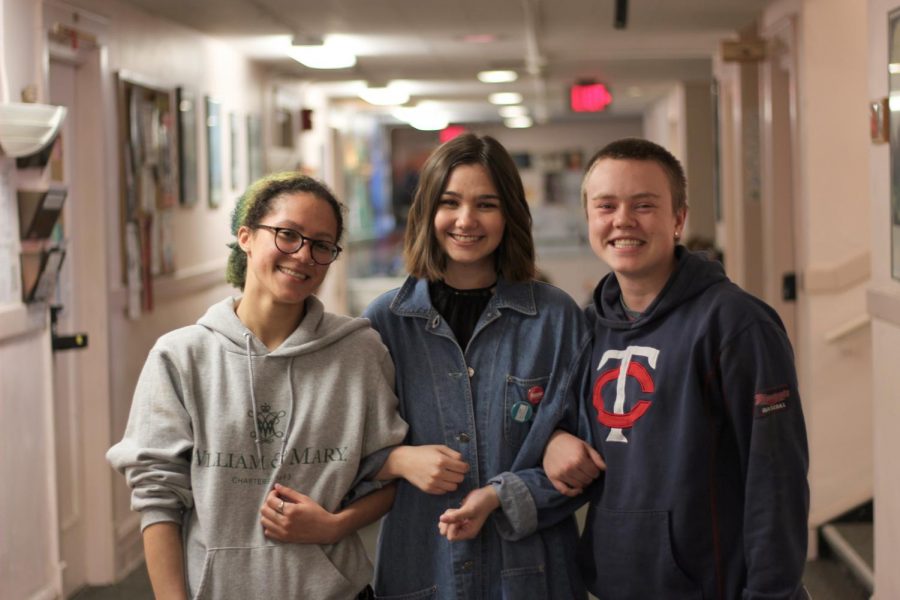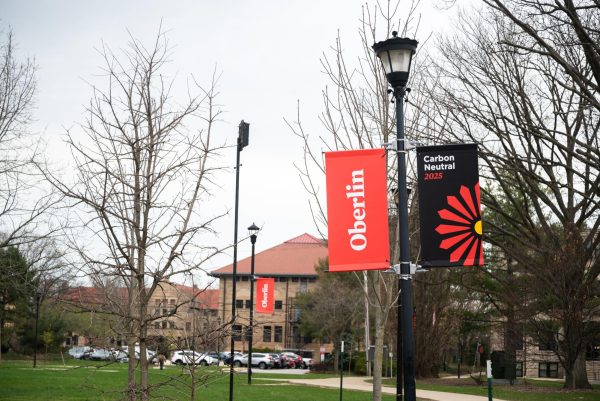SHILs Offer Support, Advocate for Students
College sophomore Gio Donovan, College first-year Colby Fortin, and College sophomore Jojo Scott are OSCA’s three sexual harm information liaisons and hold office hours in Wilder Hall every week.
Editor’s Note: This article contains mentions of sexual misconduct and assault.
In recognition of Consent Month at Oberlin, a number of educational events for the community will be hosted throughout the month of April. This marks a collaborative effort by group of organizations including the student group Preventing and Responding to Sexual Misconduct, the Sexual Information Center, and the Office for Diversity, Equity, and Inclusion. Among those helping to put together programming are the Oberlin Student Cooperative Association’s sexual harm information liaisons, who work year-round as advocates for both OSCA members and the wider student body regarding matters of sexual misconduct on campus.
Three students — College sophomores Gio Donovan and Jojo Scott, and College first-year Colby Fortin — currently serve as SHILs. Donovan explains that SHILs work collaboratively with other resources on campus.
“Think of a [SHIL] as a point person between the student body and other resources related to … sexual harm and misconduct, both on campus and not,” Donovan said.
Within OSCA, SHILs help train housing loose ends coordinators at the beginning of each fall semester, as well as work with the membership secretary to help with housing accommodations and changes.
SHILs also provide services outside of OSCA, including helping students process past events, providing support during emergencies, supporting students who are helping others process trauma, or even anonymously getting sexual health resources like Plan B from the SIC. There is always a SHIL on call and able to provide support 24/7, and all students are encouraged to reach out to them as needed.
“You are never an inconvenience [to] the SHILs,” Donovan said. “No matter what it is, we want to be here.”
Rebecca Mosely, Title IX coordinator and director of the Office Of Equity, Diversity, and Inclusion, also noted that the Title IX office and SHILs have a unique relationship with students and the administration.
“The SHILs work very closely with me,” Mosely wrote in an email to the Review. “We meet regularly throughout the year to talk through ideas and questions they have and just in general to build a strong working relationship.”
SHILs meet with Mosely monthly to ensure they can provide the best possible support and advocacy on campus. They also develop working relationships with Campus Safety, Assistant Dean of Students and Director of Student Conduct and Community Standards Thom Julian, and the Nord Center, a local nonprofit that provides rape crisis training.
According to Scott, this range of relationships leads SHILs to have a multifaceted role on campus.
“We really are trained in the broad spectrum of support,” they said. “We can talk to people about relationships, for instance, and other subjects that fall under the umbrella of sexual justice.”
SHILs hold a special role in that they are both advocates and students. As such they are and are uniquely positioned to understand difficult situations from the level of a peer. SHILs both handle crisis situations and follow students throughout the process reporting process.
“There is a huge importance to having [first responders] being someone who you are comfortable with, someone who you live with or who you eat with, because they are part of a community that functions as a home for a lot of students,” Fortin said.
Many students on Oberlin’s campus are comforted by having SHILs as an available resource.
“They do a really good job of making themselves known by going to co-ops and making announcements [and] having posters with their faces on them,” College sophomore Eleanor Cannon remarked. “I feel safe knowing that the SHILs are always here to be a resource.”
Mosely emphasized that the role of a SHIL is unique and impactful, and that their dedication has continuously benefitted the Oberlin community.
“I have had the pleasure over my three years in this role to work with a number of different SHILs,” she wrote. “I have found all of them to be caring and knowledgeable individuals who have a deep passion for supporting students who have experienced harm. It has been an utter pleasure to get to work with these students to support their peers. It is really exciting to see the skills they build through this role and the impact they make in their work with others.”







